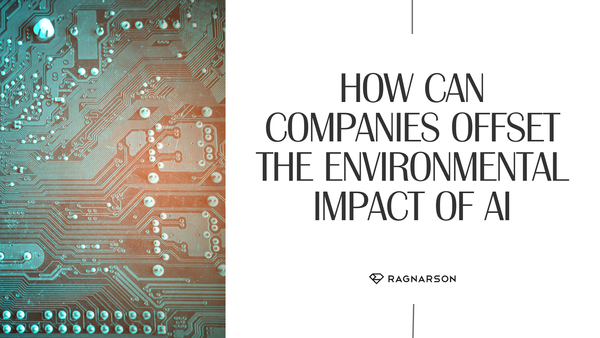How can companies offset the environmental impact of AI

Artificial intelligence (AI) is promising to revolutionize industries, drive innovation, and enhance efficiency. But, alongside its transformative potential, AI also carries a significant environmental footprint. So, how can companies navigate this green frontier and offset the environmental impact of AI?
Understanding the Environmental Impact of AI
AI systems, particularly deep learning models, require vast computational power to train and operate. This demand for computing resources translates into substantial energy consumption, often fueled by fossil fuels, and contributes to carbon emissions. Additionally, the manufacturing and disposal of hardware components, such as servers and GPUs, further exacerbate AI's environmental footprint.

Strategies for Offsetting AI's Environmental Impact
- Energy-Efficient Computing
Investing in energy-efficient hardware and optimizing AI algorithms can help reduce the energy consumption of AI systems. It includes using specialized processors designed for AI workloads and implementing algorithms that minimize computational requirements. - Renewable Energy Sourcing
Transitioning to renewable energy sources, such as solar or wind power, for powering data centers and computing infrastructure can significantly reduce the carbon footprint of AI operations. Many tech companies are already leading the way by committing to using 100% renewable energy for their operations. - Carbon Offsetting Programs
Companies can participate in carbon offsetting programs to mitigate the emissions associated with their AI operations. It may involve investing in reforestation projects, renewable energy initiatives, or carbon capture technologies to offset the carbon footprint of AI-related activities. - Lifecycle Assessments
Conducting lifecycle assessments of AI systems can help companies identify and mitigate environmental impacts across the entire lifecycle of AI technology, from manufacturing and deployment to operation and disposal. This holistic approach ensures that environmental considerations are integrated into decision-making processes. - Collaboration and Knowledge Sharing
Collaboration among industry stakeholders and sharing best practices for sustainable AI development can accelerate progress towards reducing the environmental impact of AI. Companies can leverage collective expertise and resources to drive innovation in sustainable AI technologies by working together.
The Business Case for Green AI
Beyond the ethical imperative of reducing environmental impact, adopting sustainable practices in AI can also yield tangible benefits for companies. These include:
- Cost Savings: Energy-efficient computing and renewable energy sourcing can lead to cost savings in the long run by reducing energy bills and operational expenses.
- Brand Reputation: Demonstrating a commitment to environmental sustainability can enhance brand reputation and attract environmentally conscious customers and investors.
- Regulatory Compliance: Anticipating and proactively addressing environmental regulations and standards can help companies avoid regulatory penalties and ensure compliance with emerging sustainability requirements.
Sustainable AI
As AI continues to reshape industries and redefine possibilities, companies have a unique opportunity to pioneer the path to sustainable AI development.
AI is a beacon of efficiency, promising to streamline processes and elevate human potential. Yet, in our quest for optimization, we must pause to reflect on the actual advancement cost. What is the value of faster and better if it comes at the expense of our planet's wellbeing?
To truly harness the transformative power of AI to improve human life, we must redefine our success metrics. It's not enough to prioritize time and budgets; we must also safeguard the foundation of our existence—the planet we call home.
Remember that authentic progress is measured by the heights we reach and the depths of our compassion and foresight. AI may enhance our lives and preserve our planet's precious gift for generations to come.

